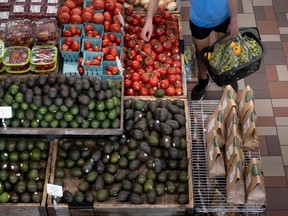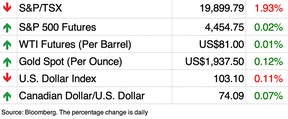Breadcrumb Trail Links
News Executive Summary
They fear climate change is affecting the country’s ability to grow food, study says

Article content

As Canadians’ grocery bills balloon in the face of food inflation, people are also beginning to worry about another crisis that may soon impact their food choices: climate change.
Article content
People appear to be growing more concerned about the impact of a warming planet on Canada’s food security, according to new research from the Agri-Food Analytics Lab at Dalhousie University, conducted by Caddie. In a July survey of 5,450 Canadians, 61 per cent said they fear climate change is affecting the country’s ability to grow food.
Advertisement 2
Article content
Overall, around half of those polled said they are “very” or “extremely” worried about climate change, and close to three quarters think it’s already causing extreme weather events, such as droughts, floods and wildfires.
Those beliefs are leading to fears climate change will keep some foods off grocery store shelves, with 47.1 per cent saying that’s a concern, compared to only 22.2 per cent who have no concerns at all.
That scenario might already be playing out on grocery story shelves. Some 40 per cent say they’ve already seen evidence of shortages of certain foods over the past few summers, though the study didn’t identify which foods people claim are getting harder to find.
Such perceived shortages may be causing some to become more conscious of the environmental impacts of the foods they consume. Thirty-seven per cent say they think twice about what they buy at the grocery store based on how eco-friendly the item is. Across the country, shoppers in Quebec were most likely to consider environmental impacts of foods, while those in Saskatchewan were least concerned.
Article content
Advertisement 3
Article content
Still, Canadians appear to be fairly optimistic that the country’s food system will be able to weather climate change impacts, and 60 per cent are confident they’ll be able to find all the fresh produce and meats they want in the years to come.
Climate change is considered a major threat to Canada’s food sector, the report said, and both consumers and the industry may find they’ll need to adapt as extreme weather becomes more common.
“Our study highlights the growing importance of climate-conscious eating habits and raises awareness about the need for sustainable practices in the agri-food sector,” Sylvain Charlebois, director of the Agri-Food Lab, said in a news release.
_____________________________________________________________
Was this newsletter forwarded to you? Sign up here to get it delivered to your inbox._____________________________________________________________


Consumer prices bounced up in July after decelerating almost every month since peaking in June last year, possibly signalling that the Bank of Canada could be entering one of the most difficult phases of its inflation fight.
Advertisement 4
Article content
Canadians paid 3.3 per cent more for goods and services in July than a year ago, Statistics Canada said on Aug. 15. Economists were expecting a three per cent increase after the consumer price index (CPI) fell into the central bank’s target of one to three per cent in June with a reading of 2.8 per cent, the first time it’s been in range since March 2021.
On a monthly basis, inflation rose 0.6 per cent in July compared to 0.1 per cent gain in June.
The Bank of Canada’s preferred core measures of inflation, which exclude volatile items from the CPI, were hardly changed. The CPI median was 3.7 per cent, the same as in June, but CPI trim fell 0.1 percentage points to 3.6 per cent.
Read the full story by the Financial Post’s Bianca Bharti.
___________________________________________________

Advertisement 5
Article content
___________________________________________________


_______________________________________________________


How rain in Vancouver shocks the food system

What a $15 bag of romaine says about our food system
____________________________________________________

Couples may want to consider combining their finances. New research shows there is a strong case to be made for co-mingling finances, even in the face of some potential drawbacks. Columnist Jason Heath explains the benefits.
____________________________________________________
Today’s Posthaste was written by Victoria Wells (@vwells80), with additional reporting from Financial Post staff, The Canadian Press, Thomson Reuters and Bloomberg.
Have a story idea, pitch, embargoed report, or a suggestion for this newsletter? Email us at posthaste@postmedia.com.









Comments
Postmedia is committed to maintaining a lively but civil forum for discussion and encourage all readers to share their views on our articles. Comments may take up to an hour for moderation before appearing on the site. We ask you to keep your comments relevant and respectful. We have enabled email notifications—you will now receive an email if you receive a reply to your comment, there is an update to a comment thread you follow or if a user you follow comments. Visit our Community Guidelines for more information and details on how to adjust your email settings.
Join the Conversation